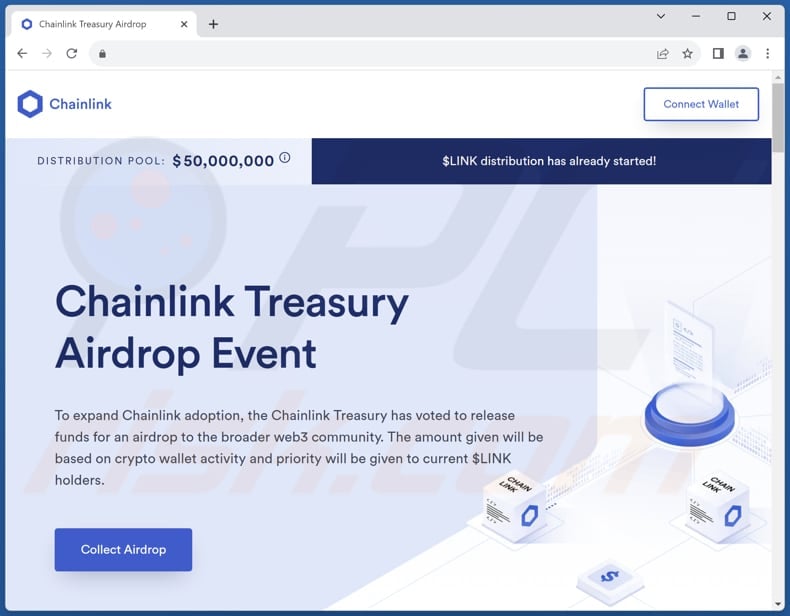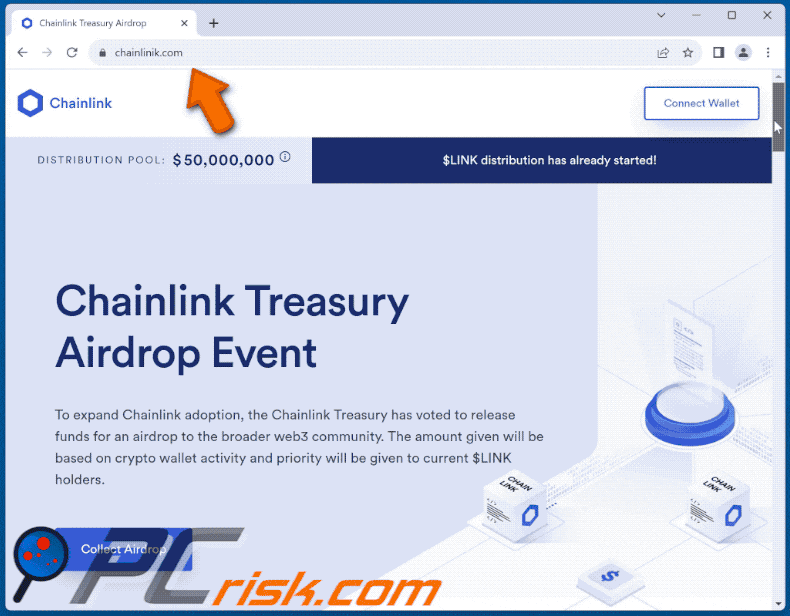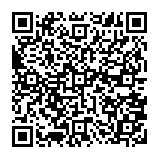How to avoid getting scammed through campaigns like "Chainlink Treasury Airdrop Event"
![]() Written by Tomas Meskauskas on
Written by Tomas Meskauskas on
What kind of scam is "Chainlink Treasury Airdrop Event"?
Upon examining the "Chainlink Treasury Airdrop Event", our investigation has exposed it as a fraudulent scheme designed to obtain sensitive information with the intention of financial exploitation. Usually, such scams are promoted via email, social media platforms, deceptive ads, and unreliable websites.

"Chainlink Treasury Airdrop Event" scam in detail
The text on the page falsely claims that, in an effort to boost Chainlink adoption, the Chainlink Treasury has supposedly approved the disbursement of funds for a widespread airdrop within the Web3 community.
The stated criterion for eligibility suggests that the distribution amount hinges on crypto wallet activity, with purported emphasis given to existing holders of the $LINK cryptocurrency. However, it is important to note that this narrative is part of a scam designed to lure individuals into divulging sensitive information, ultimately for malicious monetary purposes.
This deceptive webpage provides a set of instructions urging users to engage in actions that are part of the scam. After completing those steps, users are led to believe that they will receive rewards. In reality, scammers behind this page aim to lure users into providing their crypto wallet login credentials.
When scammers obtain login credentials for crypto wallets, they gain unauthorized access to the victim's cryptocurrency holdings. They initiate unauthorized transactions to transfer cryptocurrency from the victim's wallet to their controlled wallets.
Also, scammers may use the stolen credentials to threaten victims with the loss of their funds unless a ransom is paid. Victims should be cautious about complying with such demands, as there is no guarantee that the scammers will uphold any promises.
| Name | Chainlink Treasury Airdrop Event crypto scam |
| Threat Type | Phishing, Scam, Social Engineering, Fraud |
| Fake Claim | Users are eligible for a reward |
| Disguise | Legitimate cryptocurrency airdrop |
| Related Domain | chainlinik[.]com |
| Detection Names (chainlinik[.]com) | Emsisoft (Phishing), PhishFort (Malicious), Full List Of Detections (VirusTotal) |
| Distribution methods | Compromised websites, rogue online pop-up ads, unwanted applications, notifications from shady websites, email, social media. |
| Damage | Loss of sensitive private information, monetary loss, identity theft. |
| Malware Removal (Windows) | To eliminate possible malware infections, scan your computer with legitimate antivirus software. Our security researchers recommend using Combo Cleaner. |
Similar scams in general
Cryptocurrency scams typically share common elements, including deceptive lures that promise quick profits, a sense of urgency to pressure victims into immediate action, the use of phishing tactics through fake websites, and the solicitation of private information like wallet credentials. As a rule, the main purpose of such scams is to steal cryptocurrency.
More examples of similar scams are "Bittrex Email Scam", "Shibarium Scam", and "Brad Garlinghouse Crypto Giveaway".
How did I open a scam website?
Users can unknowingly open scam websites through phishing emails containing deceptive links, leading to fraudulent platforms mimicking legitimate ones. These scams often trick users into divulging sensitive information. Additionally, cybercriminals manipulate search engine results, making fake websites appear prominently.
Other methods include social engineering tactics, where scammers create fake social media accounts or use messaging apps to share links that redirect users to scam sites. Ads and notifications from shady pages are also used to promote scams. Sometimes, users end up on scam sites via torrent sites, illegal movie streaming pages, and similar channels.
How to avoid visiting scam pages?
Exercise caution when clicking on links received in unsolicited emails or messages, especially those urging urgent action or offering extraordinary rewards. Verify the legitimacy of websites by carefully examining the URL for any misspellings or variations from official addresses.
Do not trust ads and links on questionable websites or agree to receive notifications from pages of this kind. Download apps from reliable sources (official sites and app stores). Regularly update and use reputable antivirus and anti-malware software. If your computer is already infected with unwanted apps, we recommend running a scan with Combo Cleaner Antivirus for Windows to automatically eliminate them.
The appearance of "Chainlink Treasury Airdrop Event" pop-up scam (GIF):

Text on this page:
Chainlink Treasury Airdrop Event
To expand Chainlink adoption, the Chainlink Treasury has voted to release funds for an airdrop to the broader web3 community. The amount given will be based on crypto wallet activity and priority will be given to current $LINK holders.
Instant automatic malware removal:
Manual threat removal might be a lengthy and complicated process that requires advanced IT skills. Combo Cleaner is a professional automatic malware removal tool that is recommended to get rid of malware. Download it by clicking the button below:
▼ DOWNLOAD Combo Cleaner
By downloading any software listed on this website you agree to our Privacy Policy and Terms of Use. To use full-featured product, you have to purchase a license for Combo Cleaner. 7 days free trial available. Combo Cleaner is owned and operated by Rcs Lt, the parent company of PCRisk.com read more.
Quick menu:
- What is Chainlink Treasury Airdrop Event crypto scam?
- How to identify a pop-up scam?
- How do pop-up scams work?
- How to remove fake pop-ups?
- How to prevent fake pop-ups?
- What to do if you fell for a pop-up scam?
How to identify a pop-up scam?
Pop-up windows with various fake messages are a common type of lures cybercriminals use. They collect sensitive personal data, trick Internet users into calling fake tech support numbers, subscribe to useless online services, invest in shady cryptocurrency schemes, etc.
While in the majority of cases these pop-ups don't infect users' devices with malware, they can cause direct monetary loss or could result in identity theft.
Cybercriminals strive to create their rogue pop-up windows to look trustworthy, however, scams typically have the following characteristics:
- Spelling mistakes and non-professional images - Closely inspect the information displayed in a pop-up. Spelling mistakes and unprofessional images could be a sign of a scam.
- Sense of urgency - Countdown timer with a couple of minutes on it, asking you to enter your personal information or subscribe to some online service.
- Statements that you won something - If you haven't participated in a lottery, online competition, etc., and you see a pop-up window stating that you won.
- Computer or mobile device scan - A pop-up window that scans your device and informs of detected issues - is undoubtedly a scam; webpages cannot perform such actions.
- Exclusivity - Pop-up windows stating that only you are given secret access to a financial scheme that can quickly make you rich.
Example of a pop-up scam:

How do pop-up scams work?
Cybercriminals and deceptive marketers usually use various advertising networks, search engine poisoning techniques, and shady websites to generate traffic to their pop-ups. Users land on their online lures after clicking on fake download buttons, using a torrent website, or simply clicking on an Internet search engine result.
Based on users' location and device information, they are presented with a scam pop-up. Lures presented in such pop-ups range from get-rich-quick schemes to fake virus scans.
How to remove fake pop-ups?
In most cases, pop-up scams do not infect users' devices with malware. If you encountered a scam pop-up, simply closing it should be enough. In some cases scam, pop-ups may be hard to close; in such cases - close your Internet browser and restart it.
In extremely rare cases, you might need to reset your Internet browser. For this, use our instructions explaining how to reset Internet browser settings.
How to prevent fake pop-ups?
To prevent seeing pop-up scams, you should visit only reputable websites. Torrent, Crack, free online movie streaming, YouTube video download, and other websites of similar reputation commonly redirect Internet users to pop-up scams.
To minimize the risk of encountering pop-up scams, you should keep your Internet browsers up-to-date and use reputable anti-malware application. For this purpose, we recommend Combo Cleaner Antivirus for Windows.
What to do if you fell for a pop-up scam?
This depends on the type of scam that you fell for. Most commonly, pop-up scams try to trick users into sending money, giving away personal information, or giving access to one's device.
- If you sent money to scammers: You should contact your financial institution and explain that you were scammed. If informed promptly, there's a chance to get your money back.
- If you gave away your personal information: You should change your passwords and enable two-factor authentication in all online services that you use. Visit Federal Trade Commission to report identity theft and get personalized recovery steps.
- If you let scammers connect to your device: You should scan your computer with reputable anti-malware (we recommend Combo Cleaner Antivirus for Windows) - cyber criminals could have planted trojans, keyloggers, and other malware, don't use your computer until removing possible threats.
- Help other Internet users: report Internet scams to Federal Trade Commission.
Frequently Asked Questions (FAQ)
What is a crypto scam?
A crypto scam refers to fraudulent activities within the cryptocurrency space, where scammers use deceptive tactics to trick others into providing sensitive information, making unauthorized transactions, or participating in fake investment schemes.
I have provided my login credentials when tricked by a crypto scam, what should I do?
If you have shared your crypto wallet login credentials in a scam, act swiftly to safeguard your assets. Immediately change the password or seed phrase for your compromised wallet, enable two-factor authentication if available, and notify your wallet provider.
Why do I encounter crypto and other scams?
Scammers leverage tactics like phishing emails, social engineering, and deceptive websites to exploit individuals. Users may also encounter scams through misleading advertisements, search engine manipulation, or unsolicited messages that lead them to fraudulent platforms.
Will Combo Cleaner protect me from scams?
Combo Cleaner is crafted to scan each website you visit, proficiently identifying any malicious ones it encounters. This includes scam websites. In such instances, immediate warnings will be issued, and access will be restricted to protect your online experience.


▼ Show Discussion